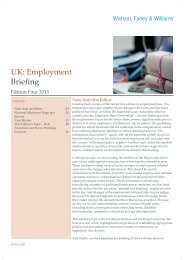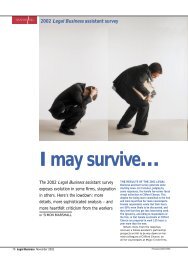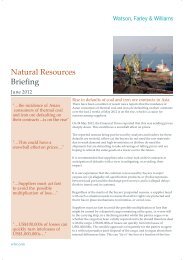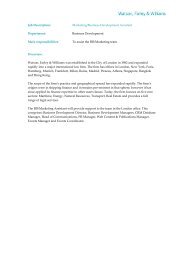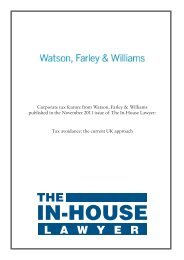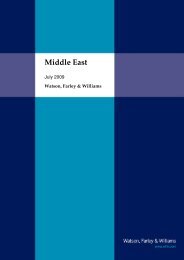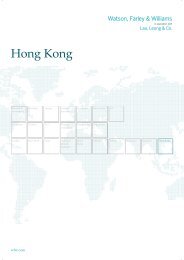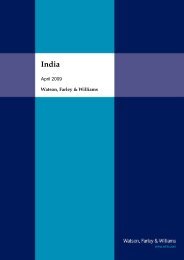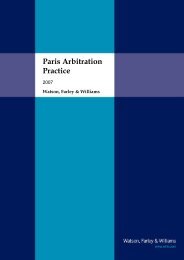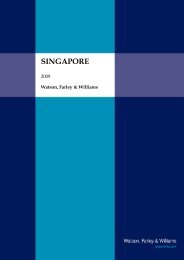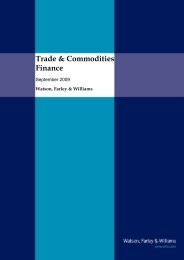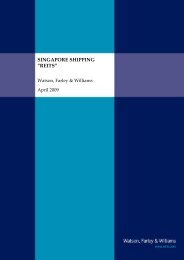Investment Treaty Update - Watson, Farley & Williams
Investment Treaty Update - Watson, Farley & Williams
Investment Treaty Update - Watson, Farley & Williams
You also want an ePaper? Increase the reach of your titles
YUMPU automatically turns print PDFs into web optimized ePapers that Google loves.
“...THE ISSUE OF WHETHER AN INVESTOR CAN USE ANMFN CLAUSE TO INVOKE MORE FAVOURABLE DISPUTESETTLEMENT MECHANISMS IS MORE CONTROVERSIAL,AND REMAINS ONE OF THE MAIN AREAS OF DEBATE ININVESTMENT TREATY LAW.”The tribunal disagreed with the CMS tribunal by concludingthat during the period 1 December 2001 until 26 April 2003Argentina was in a period of crisis necessitating emergencymeasures for the maintenance of public order and theprotection of essential security interests. The tribunal acceptedthat by December 2001 the situation in the country requiredimmediate and decisive action to restore civil order and stopthe continuing economic decline, the severity of which wascomparable to an event such as a military invasion.Consequently, Argentina was excused by Article XI of the BITfrom liability to pay compensation for breaches of the treatyoccurring between 1 December 2001 and 26 April 2003.The tribunal also held that the seriousness of the threatposed by the economic crisis was sufficient to give rise to astate of necessity satisfying all the requirements of Article 25of the ILC’s Articles. Although Article 25 of the Articles onState Responsibility did not on its own establish Argentina’sdefence, it supported the tribunal’s findings with regard toArticle XI of the BIT.CommentThe defence of necessity under customary international law hasrarely been successfully invoked, and tribunals and courts haveconsistently emphasised that a state must satisfy stringentcriteria (as per Article 25 of the ILC’s Articles) before excusingits conduct on these grounds. The decision in LG&E is thereforeunusual, and it remains to be seen whether other tribunalsdealing with claims against Argentina (or against other hoststates which have experienced economic instability) will adoptsimilar findings. Allowing necessity to be invoked in times ofeconomic crisis could have significant implications forinternational investors, since it is in such periods that hoststates may be most inclined to take extreme measures anddisregard the interests of foreign investors. If the defence ofnecessity is successfully invoked in future investment treatydisputes, it could seriously detract from the level of protectionafforded by a BIT, as well as discouraging inward investment instates with a history of economic turbulence.<strong>Treaty</strong> ShoppingThe last six months have seen a series of decisions onjurisdiction concerning the interpretation of most favourednation clauses in BITs. The “most favoured nation” or “MFN”clause is a standard provision found in most investmenttreaties, whereby the signatories promise that an investor fromthe other state, or its investment, will be treated by the hoststate “no less favourably” than an investor from a third country.Such an apparently innocuous provision can have a profoundeffect upon an investor’s rights, since it is capable of allowingthe wholesale importation into treaties of more favourablesubstantive rights granted by the host state to investors fromelsewhere. However, the issue of whether an investor can usean MFN clause to invoke more favourable dispute settlementmechanisms is more controversial, and remains one of the mainareas of debate in investment treaty law.The Maffezini and Plama decisionsThe issue was famously considered by a tribunal in Maffezini vSpain, an arbitration concerning a claim under the Argentina-Spain BIT. The Argentine investor invoked an MFN clause in theArgentina-Spain BIT to override the requirement that an investorfirst had to submit the dispute to the host state’s competentcourts and defer commencing an arbitration under the treatyuntil either (i) the competent court had ruled on the dispute; or(ii) eighteen months had passed with no decision. The tribunalheld that the MFN clause was such that the investor couldbenefit from the more favourable dispute resolution mechanismcontained in the Spain-Chile BIT, which imposed norequirement to resort to local courts before commencingarbitration.Since the Maffezini decision, tribunals have been inconsistentin their approach to similar arguments. Three tribunals havefollowed Maffezini (Siemens v The Argentine Republic(3 August 2004), Camuzzi v The Argentine Republic (10 June2005) and Gas Natural v The Argentine Republic (17 June2005)); one has questioned the decision but ultimatelydistinguished the applicable clause on the basis of its specificwording (Salini Costrutti v Jordan (15 November 2004)) andanother has rejected it entirely (Plama Consortium v Bulgaria(8 February 2005)).The Plama arbitration concerned a claim against the Bulgariangovernment under the Cyprus-Bulgaria BIT. The investor soughtto overcome Bulgaria’s limited consent (contained in the BIT) toad hoc UNCITRAL arbitration of disputes “with regard to theamount of compensation” due to an investor only after themerits had been adjudicated “through the regular administrativeand legal procedure(s) of (Bulgaria)”. It did so by relying on theBIT’s MFN clause to import a wider consent to ICSID arbitrationof general investment disputes contained in other BulgarianBITs. In its decision, the Plama tribunal rejected the reasoningadopted in Maffezini, commenting that “the expansiveinterpretation of (the MFN clause) made in the Maffezini case… went beyond what State Parties to BITs generally intendedto achieve by an MFN provision in a bilateral or multilateralinvestment treaty”. The Plama tribunal held that an MFNclause “does not incorporate by reference dispute settlementTHE INVESTMENT TREATY UPDATE WATSON, FARLEY & WILLIAMS ARBITRATION GROUP 03



